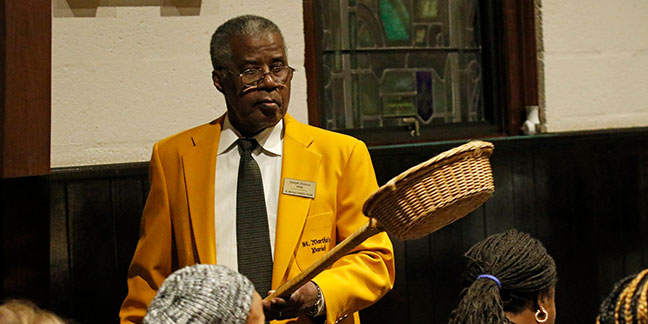SALISBURY — Father Richard Farwell, a diocesan priest most recently serving in ministry outside the Diocese of Charlotte, turned himself in to Rowan County authorities Aug. 7. He was charged with allegedly taking indecent liberties with a minor. He was released on a $3,000 bond, and is represented by private counsel.
Father Farwell had been serving in ministry outside the diocese [at his request] since 2000. Specifically, he worked in ministry with Food for the Poor in Deerfield Beach, Fla.
In April, Food for the Poor fired Father Farwell following receipt of an allegation of sexual misconduct filed in Rowan County. At that time, the Diocese of Charlotte placed
Father Farwell on administrative leave. Removing a priest from active ministry is standard policy for the diocese in cases of alleged sexual misconduct.
In February 1999, the alleged victim made an allegation that Father Richard Farwell had molested him once 19 years ago when the alleged victim was between 10 and 12 years of age. Father Farwell denied the charge and the alleged victim was informed. The diocese sought to verify the claim; the alleged victim would not purse the claim stating he did not want his name publicly revealed.
In April of this year, the Diocese of Charlotte received a letter from the alleged victim’s mother stating her son was now ready to come forth. The diocese then contacted the alleged victim to verify the information was received from his mother. In accordance with diocesan policy, the incident was reported to the Rowan County Department of Social Services and also referred to a diocesan committee for review.
Father Farwell, ordained in 1981, served parishes in Charlotte, Salisbury, and had been pastor in Lincolnton prior to his leave to serve outside the diocese.
— Joann Keane, Catholic News Herald
 CHARLOTTE — Parishes across the Diocese of Charlotte will take up a special collection for relief efforts and other work of the Church at all Masses the weekend of May 17-18 as part of the International/National Combined Collection.
CHARLOTTE — Parishes across the Diocese of Charlotte will take up a special collection for relief efforts and other work of the Church at all Masses the weekend of May 17-18 as part of the International/National Combined Collection.
Coordinated by the U.S. Conference of Catholic Bishops, donations received from this annual collection benefit five organizations: Catholic Relief Services, Collection for the Holy Land, Collection for the Works of the Holy Father (Peter’s Pence), The Catholic University of America and the Catholic Communications Campaign.
— Catholic News Herald
How your donations are used:
- The Catholic Relief Services Collection supports Catholic Church organizations that carry out international relief and solidarity efforts. Programs include relief and resettlement for victims of persecution, war and natural disasters; development projects to improve living conditions for the poor; legal and support services for poor immigrants; peace and reconciliation work for people suffering from violence; and advocacy on behalf of the powerless.
- The Collection for the Holy Land supports the work of the Franciscans working in the Holy Land. The Franciscans of the Custody of the Holy Land have the unique responsibility of caring for the holy places as well as caring for the Christians who live in the Holy Land.
- The Collection for the Works of the Holy Father (formerly called Peter’s Pence) provides the Holy Father with the financial means to respond to those who are suffering as a result of war, oppression, natural disaster and disease. The USCCB National Collections Committee oversees the promotion of this collection.
- The Collection for The Catholic University of America underwrites scholarships to assist financially deserving students in completing their education at CUA in more than 50 disciplines.
- Through websites, social networks, television, radio and print, the Catholic Communication Campaign helps the Church spread the Gospel message through the media locally and nationally. Half of all donations to the CCC collected in the diocese stay in the diocese to support local communications needs, such as radio and television programming and diocesan publications.

